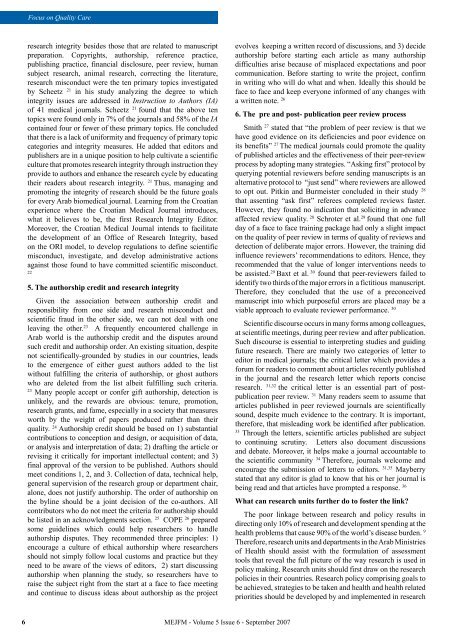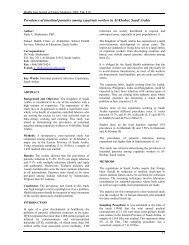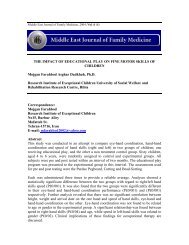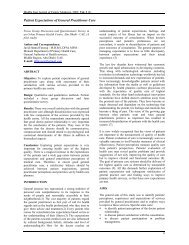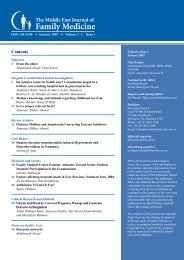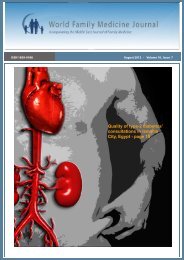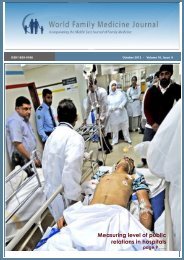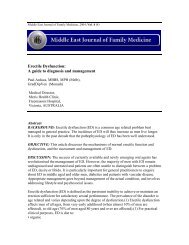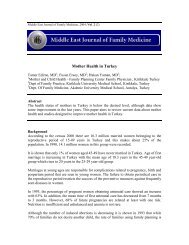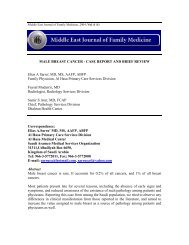Contents - Middle East Journal of Family Medicine
Contents - Middle East Journal of Family Medicine
Contents - Middle East Journal of Family Medicine
- No tags were found...
You also want an ePaper? Increase the reach of your titles
YUMPU automatically turns print PDFs into web optimized ePapers that Google loves.
Focus on Quality Care<br />
research integrity besides those that are related to manuscript<br />
preparation. Copyrights, authorship, reference practice,<br />
publishing practice, financial disclosure, peer review, human<br />
subject research, animal research, correcting the literature,<br />
research misconduct were the ten primary topics investigated<br />
by Scheetz 21 in his study analyzing the degree to which<br />
integrity issues are addressed in Instruction to Authors (IA)<br />
<strong>of</strong> 41 medical journals. Scheetz 21 found that the above ten<br />
topics were found only in 7% <strong>of</strong> the journals and 58% <strong>of</strong> the IA<br />
contained four or fewer <strong>of</strong> these primary topics. He concluded<br />
that there is a lack <strong>of</strong> uniformity and frequency <strong>of</strong> primary topic<br />
categories and integrity measures. He added that editors and<br />
publishers are in a unique position to help cultivate a scientific<br />
culture that promotes research integrity through instruction they<br />
provide to authors and enhance the research cycle by educating<br />
their readers about research integrity. 21 Thus, managing and<br />
promoting the integrity <strong>of</strong> research should be the future goals<br />
for every Arab biomedical journal. Learning from the Croatian<br />
experience where the Croatian Medical <strong>Journal</strong> introduces,<br />
what it believes to be, the first Research Integrity Editor.<br />
Moreover, the Croatian Medical <strong>Journal</strong> intends to facilitate<br />
the development <strong>of</strong> an Office <strong>of</strong> Research Integrity, based<br />
on the ORI model, to develop regulations to define scientific<br />
misconduct, investigate, and develop administrative actions<br />
against those found to have committed scientific misconduct.<br />
22<br />
5. The authorship credit and research integrity<br />
Given the association between authorship credit and<br />
responsibility from one side and research misconduct and<br />
scientific fraud in the other side, we can not deal with one<br />
leaving the other. 23 A frequently encountered challenge in<br />
Arab world is the authorship credit and the disputes around<br />
such credit and authorship order. An existing situation, despite<br />
not scientifically-grounded by studies in our countries, leads<br />
to the emergence <strong>of</strong> either guest authors added to the list<br />
without fulfilling the criteria <strong>of</strong> authorship, or ghost authors<br />
who are deleted from the list albeit fulfilling such criteria.<br />
23<br />
Many people accept or confer gift authorship, detection is<br />
unlikely, and the rewards are obvious: tenure, promotion,<br />
research grants, and fame, especially in a society that measures<br />
worth by the weight <strong>of</strong> papers produced rather than their<br />
quality. 24 Authorship credit should be based on 1) substantial<br />
contributions to conception and design, or acquisition <strong>of</strong> data,<br />
or analysis and interpretation <strong>of</strong> data; 2) drafting the article or<br />
revising it critically for important intellectual content; and 3)<br />
final approval <strong>of</strong> the version to be published. Authors should<br />
meet conditions 1, 2, and 3. Collection <strong>of</strong> data, technical help,<br />
general supervision <strong>of</strong> the research group or department chair,<br />
alone, does not justify authorship. The order <strong>of</strong> authorship on<br />
the byline should be a joint decision <strong>of</strong> the co-authors. All<br />
contributors who do not meet the criteria for authorship should<br />
be listed in an acknowledgments section. 25 COPE 26 prepared<br />
some guidelines which could help researchers to handle<br />
authorship disputes. They recommended three principles: 1)<br />
encourage a culture <strong>of</strong> ethical authorship where researchers<br />
should not simply follow local customs and practice but they<br />
need to be aware <strong>of</strong> the views <strong>of</strong> editors, 2) start discussing<br />
authorship when planning the study, so researchers have to<br />
raise the subject right from the start at a face to face meeting<br />
and continue to discuss ideas about authorship as the project<br />
evolves keeping a written record <strong>of</strong> discussions, and 3) decide<br />
authorship before starting each article as many authorship<br />
difficulties arise because <strong>of</strong> misplaced expectations and poor<br />
communication. Before starting to write the project, confirm<br />
in writing who will do what and when. Ideally this should be<br />
face to face and keep everyone informed <strong>of</strong> any changes with<br />
a written note. 26<br />
6. The pre and post- publication peer review process<br />
Smith 27 stated that “the problem <strong>of</strong> peer review is that we<br />
have good evidence on its deficiencies and poor evidence on<br />
its benefits” 27 The medical journals could promote the quality<br />
<strong>of</strong> published articles and the effectiveness <strong>of</strong> their peer-review<br />
process by adopting many strategies. “Asking first” protocol by<br />
querying potential reviewers before sending manuscripts is an<br />
alternative protocol to “just send” where reviewers are allowed<br />
to opt out. Pitkin and Burmeister concluded in their study 28<br />
that assenting “ask first” referees completed reviews faster.<br />
However, they found no indication that soliciting in advance<br />
affected review quality. 28 Schroter et al. 29 found that one full<br />
day <strong>of</strong> a face to face training package had only a slight impact<br />
on the quality <strong>of</strong> peer review in terms <strong>of</strong> quality <strong>of</strong> reviews and<br />
detection <strong>of</strong> deliberate major errors. However, the training did<br />
influence reviewers’ recommendations to editors. Hence, they<br />
recommended that the value <strong>of</strong> longer interventions needs to<br />
be assisted. 29 Baxt et al. 30 found that peer-reviewers failed to<br />
identify two thirds <strong>of</strong> the major errors in a fictitious manuscript.<br />
Therefore, they concluded that the use <strong>of</strong> a preconceived<br />
manuscript into which purposeful errors are placed may be a<br />
viable approach to evaluate reviewer performance. 30<br />
Scientific discourse occurs in many forms among colleagues,<br />
at scientific meetings, during peer review and after publication.<br />
Such discourse is essential to interpreting studies and guiding<br />
future research. There are mainly two categories <strong>of</strong> letter to<br />
editor in medical journals; the critical letter which provides a<br />
forum for readers to comment about articles recently published<br />
in the journal and the research letter which reports concise<br />
research. 31,32 the critical letter is an essential part <strong>of</strong> postpublication<br />
peer review. 31 Many readers seem to assume that<br />
articles published in peer reviewed journals are scientifically<br />
sound, despite much evidence to the contrary. It is important,<br />
therefore, that misleading work be identified after publication.<br />
33<br />
Through the letters, scientific articles published are subject<br />
to continuing scrutiny. Letters also document discussions<br />
and debate. Moreover, it helps make a journal accountable to<br />
the scientific community 34 Therefore, journals welcome and<br />
encourage the submission <strong>of</strong> letters to editors. 31,35 Mayberry<br />
stated that any editor is glad to know that his or her journal is<br />
being read and that articles have prompted a response. 36<br />
What can research units further do to foster the link<br />
The poor linkage between research and policy results in<br />
directing only 10% <strong>of</strong> research and development spending at the<br />
health problems that cause 90% <strong>of</strong> the world’s disease burden. 9<br />
Therefore, research units and departments in the Arab Ministries<br />
<strong>of</strong> Health should assist with the formulation <strong>of</strong> assessment<br />
tools that reveal the full picture <strong>of</strong> the way research is used in<br />
policy making. Research units should first draw on the research<br />
policies in their countries. Research policy comprising goals to<br />
be achieved, strategies to be taken and health and health related<br />
priorities should be developed by and implemented in research<br />
6<br />
MEJFM - Volume 5 Issue 6 - September 2007


